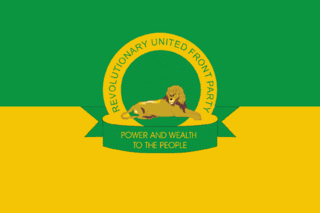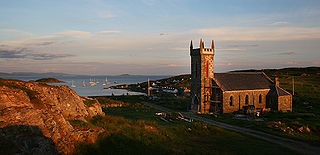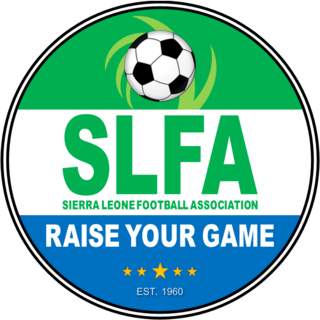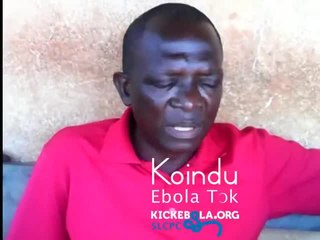Related Research Articles

Sierra Leone, officially the Republic of Sierra Leone, is a country on the southwest coast of West Africa. It is bordered to the southeast by Liberia and by Guinea to the north. Its land area is 71,740 km2 (27,699 sq mi). It has a tropical climate and environments ranging from savannas to rainforests. As of the 2015 census, Sierra Leone had a population of 7,092,113. Freetown is both its capital and its largest city. The country is divided into five administrative regions, which are further subdivided into 16 districts.

The Revolutionary United Front (RUF) was a rebel group that fought a failed eleven-year war in Sierra Leone, beginning in 1991 and ending in 2002. It later transformed into a political party, which still exists today. The three most senior surviving leaders, Issa Sesay, Morris Kallon, and Augustine Gbao, were convicted in February 2009 of war crimes and crimes against humanity.

Coll is an island located west of the Isle of Mull in the Inner Hebrides of Scotland. Coll is known for its sandy beaches, which rise to form large sand dunes, for its corncrakes, and for Breacachadh Castle. It is in the council area of Argyll and Bute.

The Mende are one of the two largest ethnic groups in Sierra Leone; their neighbours, the Temne people, constitute the largest ethnic group at 35.5% of the total population, which is slightly larger than the Mende at 31.2%. The Mende are predominantly found in the Southern Province and the Eastern Province. The Mende are mostly farmers and hunters. Some of the major cities with significant Mende populations include Bo, Kenema, Kailahun, and Moyamba.

The Gullah are a subgroup of the African American ethnic group, who predominantly live in the Lowcountry region of the U.S. states of South Carolina, North Carolina, Georgia, and Florida within the coastal plain and the Sea Islands. Their language and culture have preserved a significant influence of Africanisms as a result of their historical geographic isolation and the community's relation to their shared history and identity.

One, Two, Three is a 1961 American political comedy film directed by Billy Wilder, and written by Wilder and I. A. L. Diamond. It is based on the 1929 Hungarian one-act play Egy, kettő, három by Ferenc Molnár, with a "plot borrowed partly from" Ninotchka, a 1939 film co-written by Wilder. The film stars James Cagney, Horst Buchholz, Liselotte Pulver, Pamela Tiffin, Arlene Francis, Leon Askin and Howard St. John. It would be Cagney's last film appearance until Ragtime in 1981, 20 years later.

The Sierra Leone national football team represents Sierra Leone in association football and is governed by the Sierra Leone Football Association. It has qualified for Africa Cup of Nations three times.

Îles de Los are an island group lying off Conakry in Guinea, on the west coast of Africa. Their name is derived from the Portuguese: Ilhas dos Ídolos, "Islands of the Idols". They are located about two kilometres off the headland limiting the southern side of Sangareya Bay.

The Sierra Leonean Creole or Krio is an English-based creole language that is the lingua franca and de facto national language spoken throughout the West African nation of Sierra Leone. Krio is spoken by 96 percent of the country's population, and it unites the different ethnic groups in the country, especially in their trade and social interaction with each other. Krio is the primary language of communication among Sierra Leoneans at home and abroad, and has also heavily influenced Sierra Leonean English. The language is native to the Sierra Leone Creole people, or Krios, a community of about 104,311 descendants of freed slaves from the West Indies, Canada, United States and the British Empire, and is spoken as a second language by millions of other Sierra Leoneans belonging to the country's indigenous tribes. Krio, along with English, is the official language of Sierra Leone.
The Sierra Leonean Civil War (1991–2002) was a civil war in Sierra Leone that began on 23 March 1991 when the Revolutionary United Front (RUF), with support from the special forces of Liberian dictator Charles Taylor's National Patriotic Front of Liberia (NPFL), intervened in Sierra Leone in an attempt to overthrow the Joseph Momoh government. The resulting civil war lasted almost 11 years, and had over 50,000, up to 70,000, casualties in total; an estimated 2.5 million people were displaced during the conflict.

Amasra is a small Black Sea port town in the Bartın Province, Turkey. It is the seat of Amasra District. Its population is 6,098 (2021).

Abdulai Osman Conteh was a Sierra Leonean lawyer and politician. He was a Vice-President of Sierra Leone, who served under President Joseph Saidu Momoh before he was ousted by the military junta in 1992. Conteh later spent a considerable number of years in Belize, where he served as the country's chief justice before returning to Sierra Leone.

The Special Court for Sierra Leone, or the "Special Court" (SCSL), also called the Sierra Leone Tribunal, was a judicial body set up by the government of Sierra Leone and the United Nations to "prosecute persons who bear the greatest responsibility for serious violations of international humanitarian law and Sierra Leonean law" committed in Sierra Leone after 30 November 1996 and during the Sierra Leone Civil War. The court's working language was English. The court listed offices in Freetown, The Hague, and New York City.
East End Lions is a Sierra Leonean professional football club based in the capital Freetown. They play in the Sierra Leone National Premier League, the top football league in Sierra Leone. East End Lions represents the East End of Freetown, and play their home games at the National Stadium. The head coach, appointed in 2018 is John Keister.

Marcus Andrew Sinden is an English actor and film & theatre director and producer.
Roberta Weiss is a Canadian actress. She sometimes works professionally as Roberta Bizeau. Weiss played Flame Beaufort on NBC's soap opera Santa Barbara. Weiss is Jewish.

Sierra Leone is a multilingual country. English is the official language, and Krio is the most widely spoken language among the different ethnic groups across Sierra Leone.

The Sierra Leone Creole people are an ethnic group of Sierra Leone. The Sierra Leone Creole people are descendants of freed African-American, Afro-Caribbean, and Liberated African slaves who settled in the Western Area of Sierra Leone between 1787 and about 1885. The colony was established by the British, supported by abolitionists, under the Sierra Leone Company as a place for freedmen. The settlers called their new settlement Freetown. Today, the Sierra Leone Creoles are 1.2 percent of the population of Sierra Leone.

Daniel DeShaime is a Canadian French-language singer.

Sierra Leonean nationality law is regulated by the Constitution of Sierra Leone, as amended; the Citizenship Act, and its revisions; and various international agreements to which the country is a signatory. These laws determine who is, or is eligible to be, a national of Sierra Leone. The legal means to acquire nationality, formal legal membership in a nation, differ from the domestic relationship of rights and obligations between a national and the nation, known as citizenship. Nationality describes the relationship of an individual to the state under international law, whereas citizenship is the domestic relationship of an individual within the nation. In Britain and thus the Commonwealth of Nations, though the terms are often used synonymously outside of law, they are governed by different statutes and regulated by different authorities. Sierra Leonean nationality is based on descent from a person who is Negro-African, regardless of whether they were born in Sierra Leone, jus soli, or abroad to a Sierra Leonean, jus sanguinis. The Negro clause was inserted based upon the founding of the colony as a refuge for former slaves to prevent economically powerful communities from obtaining political power. It can be granted to persons with an affiliation to the country, or to a permanent resident who has lived in the country for a given period of time through naturalisation.
References
- 1 2 "IMDB". IMDb . Retrieved 2009-02-14.
- ↑ "Visit Sierra Leone Image Gallery - Pictures of Sierra Leone". Archived from the original on 2007-02-09. Retrieved 2009-05-03.
- 1 2 "copy of Poster" . Retrieved 2009-09-08.
- ↑ "Paroles d hommes".